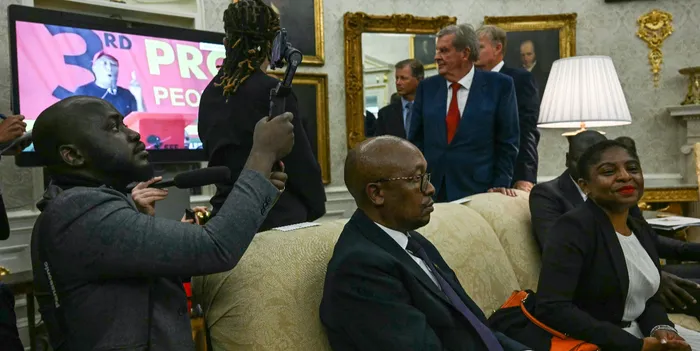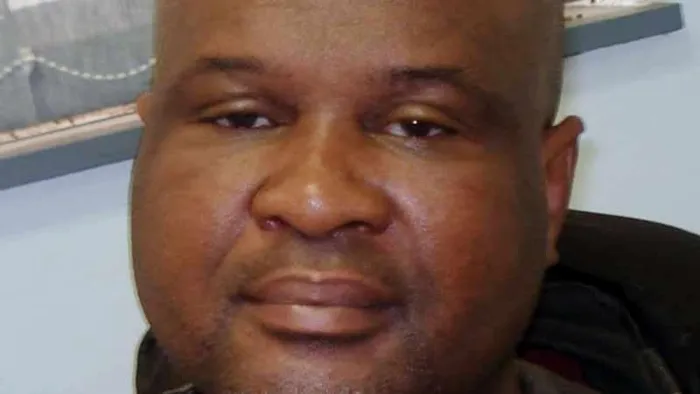What did the Trump-Ramaphosa meeting tell us about the image of SA and its leaders?
Strained bilateral relations

A video is played as US President Donald Trump meets with South African President Cyril Ramaphosa in the Oval Office of the White House in Washington last Wednesday. The meeting was amid tensions over Washington's resettlement of white Afrikaners that the US president claims are the victims of "genocide." Trump criticised EFF leader Julius Malema and the "Kill the Boer" chant, citing it as evidence of targeted violence against white Afrikaner farmers.
Image: Jim WATSON / AFP
THE much-anticipated meeting between our President Cyril Ramaphosa and his counterpart in the United States, President Donald Trump, lived up to expectations, with the latter turning up the heat on his guests.
By the admission of our delegation, South Africa is a very dangerous place because of rampant crime and lawlessness.
While the jury is still out as to whether Ramaphosa succeeded in his attempts to reset the strained bilateral relations, what is clear is that the meeting gave the international community the impression that South African leaders are failing in their constitutional duty to protect citizens and govern the country.
The result is that our pride as a beacon of hope in Africa is now hurt. The South African government came across as inept and lacking the political will to deal decisively with the scourge of violent crime, mass unemployment, and racial intolerance, to name a few crises.
We are not yet privy to what was discussed behind closed doors and the deals that were made. What will be remembered about the meeting is Trump’s wild and unsubstantiated claims of genocide suffered by Afrikaners and his display of brute power over Ramaphosa in front of the cameras. One could easily tell that Ramaphosa, like Ukraine’s Zelensky went to the White House with a begging bowl.
Unlike Zelensky, though, Ramaphosa went out of his way to massage the errant Trump’s ego and thus came across as submissive; suffice it to say that some people would argue that he was being diplomatic.
However, the big takeaway and the elephant in the room has got to be the painful admission from the South African delegation of the government’s helplessness in the fight against rampant crime.
This helplessness was in full display in 2021 during the looting spree after former President Zuma was arrested. To date, not even a single mastermind behind the 2021 riots has been successfully prosecuted. Similarly, those fingered by the Zondo Commission of Inquiry have not been prosecuted, suggesting that there’s no political will to deal decisively with corruption and wrongdoing.
This raises the question: what does this tell us about the image of South Africa and its leaders?
The image of South Africa that Trump portrayed and that the delegation conceded to was of a lawless country whose government cannot protect its citizens from violent crime. In recent years, more and more South Africans are living in fear of political assassinations, hijackings, extortionists, burglars, armed robbers, kidnappers, and taxi violence.
What exacerbates South Africa’s problems are its porous borders and corrupt officials managing the borders. Lawlessness and the lack of political will to combat crime in South Africa are attracting criminals across the continent and from abroad to come and operate in the country with impunity.
Crime in South Africa permeates every aspect of life, and it undermines good governance, efficient economic management, public safety, social order, and compliance with the law. The result is that South Africa is increasingly becoming an unattractive destination for foreign direct investment and international tourists.
No wonder our domestic economy is struggling to grow and create much-needed jobs. What this means is that the problems of high unemployment and poverty are not going away soon, and crime is likely to continue.
While Trump might not have succeeded in proving the genocide case, he appeared to succeed in making the South African delegation concede that crime, across the board, is out of control and the government is failing in its constitutional duty to protect its citizens.
South Africa’s businessman, Johann Rupert, was at pains explaining to Trump that “crime affects everyone” and that South Africa needs America’s “help to stop this awful killing….” Interestingly, Rupert made the point that South Africa needs to fix its wobbly economy to end what he labels the culture of “dependency and lawlessness.”
The portrayal of South Africa as a country that cannot fix its problems does not bode well for its aspirations as a regional leader in Africa.
South Africa styles and markets itself as a ‘bridge’ and a getaway into the African continent. Its membership of BRICS (Brazil, Russia, India, China, South Africa) and the G20 makes South Africa see itself as a spokesperson for and leader of Africa.
This begs the question: Is South Africa fit and fully equipped to be a regional leader if its government cannot provide domestic leadership?
The idea that economic problems, such as high unemployment among the youth and poverty, are to blame for intolerable levels of crime is not convincing. There are many poorer countries in Africa without high levels of crime. The difference is that there are consequences for breaking the law in many African states. In countries such as Uganda, Tanzania, and Kenya, there is a political will to hold lawbreakers accountable.
Ramaphosa’s cute move to dispel the notion of genocide:
In an attempt to debunk and send a message that there is no genocide of Afrikaners, Ramaphosa ’s entourage comprised prominent Afrikaners such as golfers Ernie Els and Retief Goosen as well as businessman Johann Rupert and John Steenhuizen, a member of Ramaphosa’s GNU Cabinet.
Even the presence of prominent Afrikaners appeared not to be enough evidence to convince Trump that the South African government is not discriminating against whites, in general, and Afrikaners, in particular. It should be remembered that the GNU has passed three laws that white political parties vehemently opposed, that is, the BELA bill, the NHI bill, and the Expropriation bill.
In this context, Trump came to the meeting wanting to put pressure on Ramaphosa to do more to accommodate the interests of the white population. This could explain why Trump saw the multi-racial composition of South Africa’s delegation to the US as superficial and condescending.
The Malema factor:
In making his case of a genocide in South Africa, Trump played a video of the EFF’s Julius Malema chanting “Kill the Boer, Kill the farmer” and even former president Zuma singing about shooting Afrikaners. Trump then baselessly claimed that “they take the land. They kill the farmer. And nothing happens to them.”
There is no doubt that these slogans and songs about killing Afrikaners do constitute hate speech and incite violence, even though the courts have found otherwise. It was quite embarrassing to see our prominent leaders utter such venomous words at a time when South Africans should be forging racial tolerance and unity.
Without realising it, Trump gave Malema the attention he craves and the status of a leader who stands up to the ‘imperialist’ West. Malema might have looked bad in the eyes of the Western audience for shouting hateful slogans, but among his sympathizers, he is now the real deal, who is feared by Western leaders.
The slogan, “Kill the Boer, Kill the farmer,” has a long history in South Africa, and it is associated with the ANC during the anti-apartheid struggle. How embarrassing it could have been for Ramaphosa had he been seen next to Zuma singing a song about shooting Afrikaners, since the video Trump played showed Zuma wearing an ANC golf shirt while still the president of the ANC.
So what message does it send to the world when prominent leaders in South Africa, including its then state president Zuma, sing about shooting and killing members of a minority group?
The governing ANC has never denounced this awful slogan. This is the same ANC government that accused Israel of genocide but tolerates leaders who advocate for the killing of a racial minority. I guess this is the hypocrisy Trump sought to expose. No wonder no meaningful racial reconciliation has happened in South Africa. Can one then blame those Afrikaners who recently emigrated to the US?

Zakhele Collison Ndlovu
Image: File
Zakhele Collison Ndlovu is a political analyst at the University of KwaZulu-Natal.
** The views expressed do not necessarily reflect the views of IOL or Independent Media.
Related Topics: